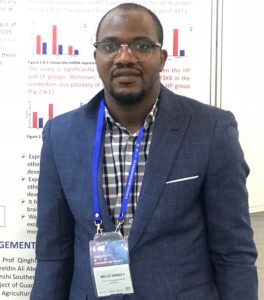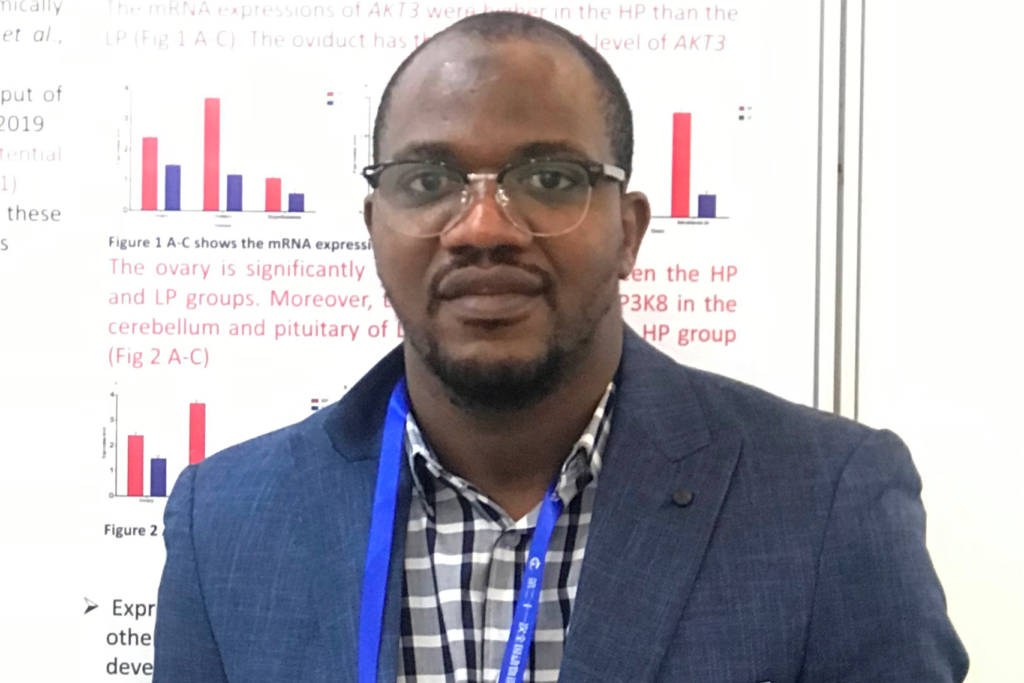We’re taking time to get to know the members of the GSA’s Early Career Scientist Committees. Join us to learn more about our early career scientist advocates.

Bello Semiu Folaniyi
Community and Membership Engagement Subcommittee
South China Agricultural University
Research Interest
I finished my doctoral degree at South China Agricultural University where I majored in Animal Breeding, Genetics, and Reproduction under the supervision of Professor Qinghua Nie, who was trained by Professor Susan J. Lamont of Iowa State University. Our research laboratory focuses on understanding the genetic and genomic mechanisms of production traits in poultry birds.
Muscovy duck is native to the tropical areas of Central and South America, with strong adaptation ability, fertility, and high meat yield. Despite the potential and adaptability of Muscovy duck, the long incubation period (35 days) and excessive broodiness have led to a decline in egg production, and low development of the Muscovy duck industry. Based on this, my PhD research work focused on the improvement of the egg production performance of this water-loving poultry bird using genomic techniques to identify the candidate genes that might serve as molecular markers for egg production in Muscovy ducks.
First, I reviewed many articles related to studies on egg production in ducks (published in Poultry Science—Bello et al; 2022). Later I studied the breeding data of 1,537 laying ducks. Based on this, I selected the four highest and four lowest egg-producing ducks at 59 weeks and euthanized them after which tissue samples were collected. The ovaries and hypothalami of these eight ducks were used for RNA-Seq. From the results, 10 potential candidate genes were revealed to be responsible for egg production. The finding from this part of my research work has been published in Poultry Science (Bello et al. 2021) and also presented at the International Society of Animal Genetics Virtual Conference held in 2021. In addition to this, I analyzed the mRNA expression of six of these potential genes in tissues related to reproduction, (the results from this finding were presented at the 21st National Symposium on Animal Genetics and Breeding, Beijing, China). Further, I identified single nucleotide polymorphism (SNPs) for two of these genes (results from a polymorphism study of one of the genes were accepted as a conference paper by the World Congress on Genetics Applied to Livestock Production (WCGALP), Rotterdam, Netherlands, 2022). Conclusively, my study provides useful information on transcriptome of hypothalamus and ovary of white Muscovy ducks, expression pattern of six of the potential genes and revealed candidate SNPs of two of the genes in relation to three egg production traits in white Muscovy ducks.
As a PhD-trained scientist, you have many career options. What interests you the most?
I was raised by a father who was a dedicated mentor and a mother who is a dedicated teacher. Their example has instilled in me a great passion to influence humanity through positive ideas and initiatives. I would like to commence my postdoctoral training program, with the goal of working at a university, so that I can train upcoming generations.
Moreover, I would like to create a foundation or channel(s) where youth will be inspired to pursue their dream goals. This became part of my career goals after the demise of my father when I was 12 years old. I have benefited one way or the other from different foundations and I believe it is necessary for me to leverage my skills and knowledge to give back to my society. I plan on doing this by mentoring the youth, providing counseling on higher education, and building networks with non-governmental organizations for available funding and training opportunities.
In addition to your research, how do you want to advance the scientific enterprise?
I believe no one is truly successful until they influence others. Based on this, I often brainstorm with my colleagues on ways to improve the knowledge gap in my country, Nigeria. During a series of discussions with them, I realized that this can be achieved by guiding others on how to enroll in their graduate studies in developed countries i.e. US, China, Canada, Australia, etc. through available scholarship or fellowship opportunities. This can create more experts who can improve the quality of research in Nigeria.
In addition, I would like to set up genomic and bioinformatics centers in my country where upcoming scientists can be equipped with advanced research trainings that would improve their theoretical knowledge at an extremely low cost. This would also be a way to create more employment in my society.
As a leader within the Genetics Society of America, what do you hope to accomplish?
Joining the Early Career Leadership Program (ECLP) at the Genetics Society of America (GSA) is a life-changing opportunity, one that will help me give back to my society. I am optimistic that as a member of the Community and Membership Engagement Subcommittee, I will be able to develop my career goals in three ways. The first will be learning skills that will be essential for achieving my future ambitions. The second will be to network with like-minded individuals from different parts of the world, which is essential for becoming a successful researcher. The third will be to learn how to manage multicultural differences among teammates in order to accomplish set goals. All three of these will help me as a scientist and an advocate working to improve the standard of living for the youth.
Previous leadership experience
Administrator, International Scholarship Forum (ISF), 2015–till date
Public Relations Officer, Project Committee, PAVON AFRIKAN VOLUNTEER (Offshoot of YALi worldwide), 2018–2019
Member, Planning Committee of 20th Anniversary of Nigerian Association of Animal Science Students (Federal University of Agriculture, Abeokuta, Nigeria), 2011–2012
Group Leader, Principles of Crop Production, Department of Plant Physiology and Crop Production (Federal University of Agriculture, Abeokuta, Nigeria), 2011
Connect with Bello Semiu:
LinkedIn: https://www.linkedin.com/in/semiu-folaniyi-bello-493490108/
Twitter: https://twitter.com/sfbello70
Publication
Research gate: https://www.researchgate.net/profile/Semiu-Bello-2













